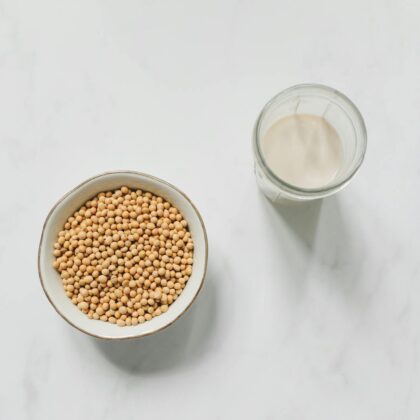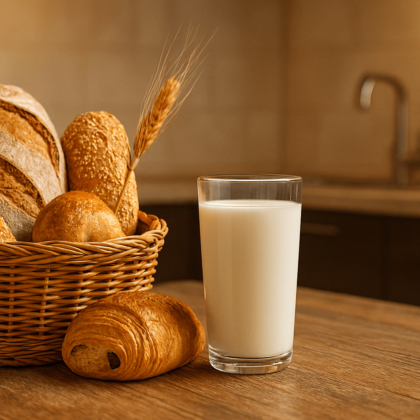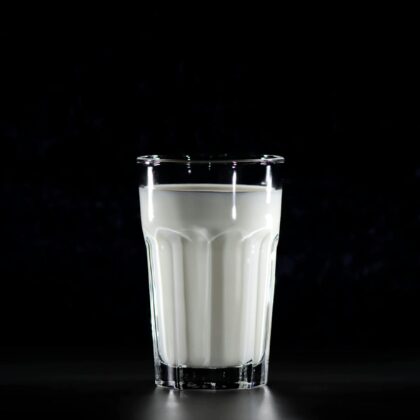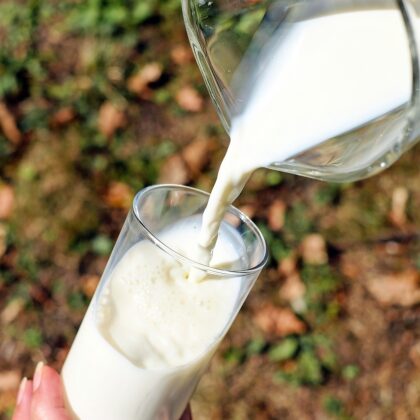
Lactose intolerance and gluten intolerance are part of everyday life for many people. While they share certain digestive disorders, they differ greatly in terms of their biological mechanisms, their prevalence and the health consequences if left untreated.
Follow the guide to understand the main differences and similarities between these two food intolerances.
Lactose and gluten: what are they?
On one side, lactose refers to sugar naturally present in milk and dairy products. It is made up of two molecules, glucose and galactose, which must be separated to be properly absorbed by the small intestine. This separation is achieved by the enzyme lactase. In people with lactose intolerance, the lack of lactase prevents the digestion of lactose and causes digestive problems of varying degrees of discomfort.
On the other, gluten is a protein naturally contained in certain cereals, such as wheat, rye, oats and barley. A distinction is made between non-celiac sensitivity to gluten and celiac disease, which is an autoimmune disease. In people with gluten intolerance, consumption of this protein is likely to trigger a variety of physical disorders.
What are the biological mechanisms behind lactose and gluten intolerance?
Lactose intolerance is due to an enzyme deficiency that occurs naturally with age in most adults. This physiological process can take several forms:
- Primary alactasia is linked to the progressive reduction in lactase after childhood.
- Secondary alactasia is the result of intestinal disease or injury.
- Congenital alactasia appears at birth when there is a total absence of lactase in the body.
In the event of lactose intolerance, the people concerned may experience some or all of the following digestive problems: bloating, abdominal pain, constipation, diarrhoea, nausea, etc.
Gluten intoleranceCeliac disease is caused by the ingestion of gluten and takes the form of inflammation of the small intestine. Non-celiac sensitivity to gluten, on the other hand, causes no visible intestinal damage. It does, however, cause similar discomforts, such as bloating, constipation, headaches and joint pain.
What are the similarities and differences between lactose- and gluten-related disorders?
Bloating, abdominal pain and a general feeling of tiredness generally occur in the context of lactose or gluten intolerance. However, these two food intolerances can be differentiated by the timing of their manifestations.
While digestive problems often appear between 30 minutes and 2 hours after lactose ingestion in the case of alactasia, they may manifest themselves as up to 72 hours after eating gluten in cases of intolerance to this protein.
While lactose intolerance is very common in the adult population (6 to 10% of the French population), gluten intolerance is fairly rare in the form of coeliac disease. It represents 1% of the world's population.However, many cases remain undiagnosed, and this autoimmune disease is on the increase.
How is lactose or gluten intolerance treated?
Managing alactasia is to eat lactose-free or lactose-reduced products, which are now available in most supermarkets. Lactase supplementation helps to facilitate lactose digestion, while the consumption of sources calcium alternatives (green vegetables, almonds, calcium-rich mineral water, etc.) provides a concrete response to the nutritional needs of lactose-intolerant people.
Managing gluten intolerance involves adopting a gluten-free dietWe pay particular attention to cross-contamination in the kitchen and when buying certified gluten-free products. Regular medical supervision is necessary for the treatment of coeliac disease.

Hello, I'm Vincent
Like you, I'm lactose intolerantI know exactly what you're going through and the difficulties you encounter on a daily basis. For over 10 years, I've been helping our customers to use our dietary supplements and giving advice and tips on how to improve their digestive comfort. I'm also a keen cook and gourmet, so you'll find my favourite recipes for a lactose-free diet in this blog.
Lactose intolerance is not inevitable! With LACTOLERANCE you can digest with complete peace of mind






